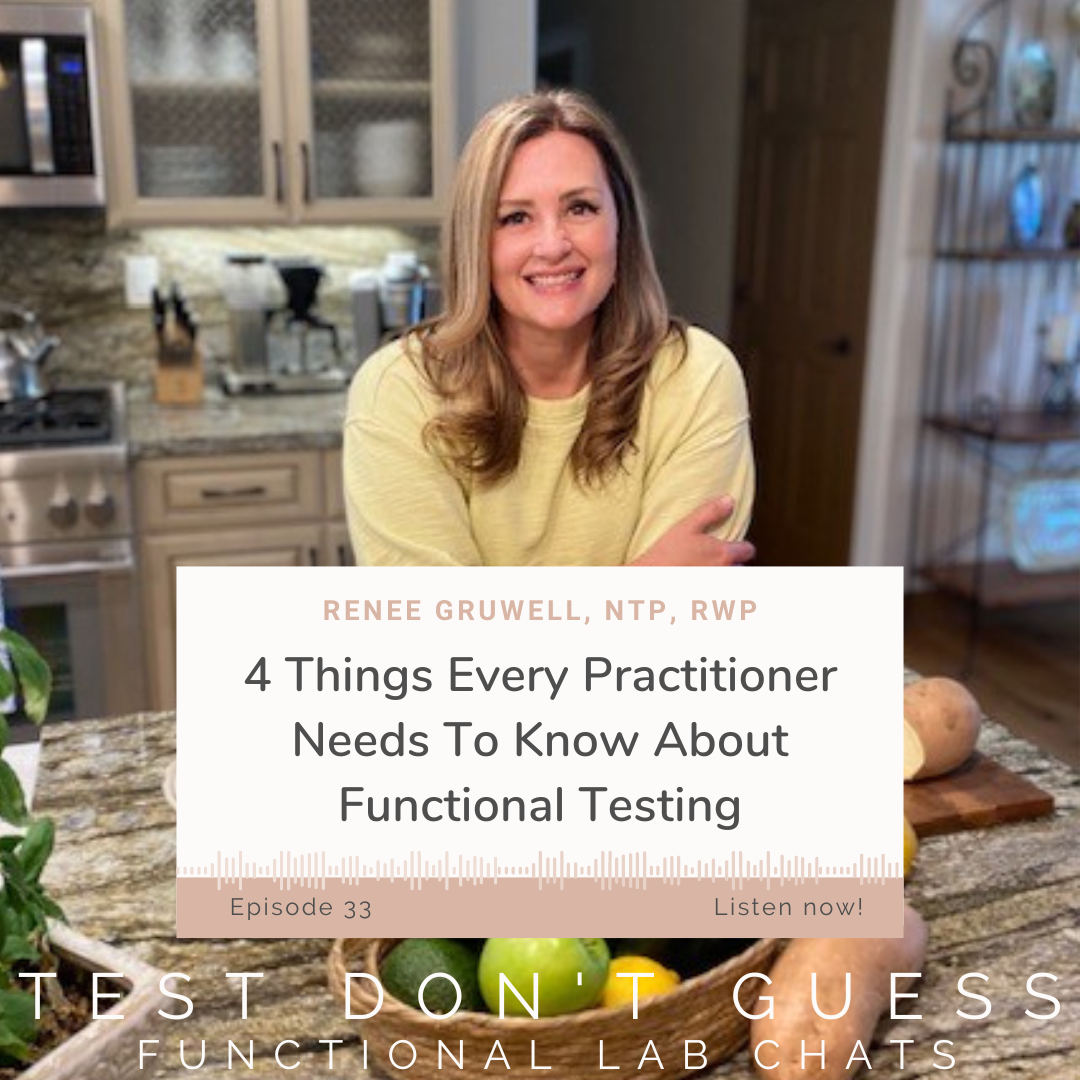Integrating functional lab testing into your practice as a new practitioner can feel overwhelming. And being unsure where to begin is completely normal! But what if you could learn from someone who’s been there? Today, we’ll break down 4 key takeaways from Renee Gruwell, NTP, RWP, to help you confidently navigate functional lab testing in your practice.
Renee’s journey into the realm of health and wellness looks a little bit different than the average practitioner’s journey. Rather than being triggered by her own health issues, Renee was determined to get to the root of her husband’s mysterious and persistent health challenges.
Her journey into functional testing began not out of curiosity, but out of necessity—a commitment to advocate for her family’s health, which soon transformed into a broader mission to empower others. Like all practitioners, her journey led her to discover key takeaways that she wished she had known from the get-go.
Must-Know #1: Build Confidence for Better Results
New practitioners often get excited about functional testing and want to jump right in. But Renee emphasizes the importance of managing expectations and building confidence gradually.
Here’s why:
- Client Success Requires More Than Data: Clients rely on you to interpret test results and create effective treatment plans. Feeling unsure can create a barrier to progress.
Focus on Practical Steps:
- Don’t Wait for Perfect Knowledge: Start with basic tests and expand your knowledge as you gain experience.
- Prioritize Client Needs Over Excitement: Tailor testing to individual needs, not every client needs every test.
- Focus on Long-Term Partnerships: Consider offering packages to build deeper client relationships and provide better long-term support.
Confidence Comes with Experience:
The more tests you run, even with initial uncertainty, the more comfortable you’ll become.
Key Takeaway: It’s okay to start slow and build confidence through experience. Prioritize client needs and manage expectations to ensure successful outcomes.
Must-Know #2: Tailored Testing for Better Outcomes
New practitioners often feel pressured to offer every test to every client. However, Renee emphasizes the importance of strategic testing based on individual needs.
Here’s Why Selective Testing Matters:
➡️Focuses on Client Needs: Not all clients need the same tests. Choose tests that address their specific symptoms and health history.
➡️Reduces Overwhelm: Avoid overwhelming clients with unnecessary information and costs.
➡️Builds Trust: Tailored testing demonstrates that you prioritize their unique situation.
➡️Streamlines Recommendations: The right tests provide valuable insights to guide effective protocols.
Getting Started with Fewer Tests is Okay:
You don’t need to be an expert in every test to begin your practice. Start with foundational tests and expand your knowledge as you gain experience.
Embrace Client Uniqueness:
Every client and practitioner is unique. Some practitioners excel with just one or two tests, while others offer a wider range. Find the approach that best suits your skills and interests.
Key Takeaway: It’s more important to provide the right tests for each client than to offer every test available. Prioritize client needs and use testing strategically to achieve better outcomes.
Must-Know #3: Look for Patterns, Not Just Markers
New practitioners can get bogged down by the details of individual test results. Renee emphasizes that stepping back and seeing the bigger picture is crucial. Here’s why:
➡️Patterns Reveal Root Causes: Don’t just chase high or low markers. Look for trends across the entire test to identify underlying imbalances.
➡️Avoid Symptom Chasing: Focusing on patterns helps you develop solutions that address the root causes of health concerns, not just manage symptoms.
➡️Holistic Approach for Better Results: Analyze test results within the context of the client’s overall health. This holistic view leads to more impactful interventions.
➡️Simplify the Complex: Patterns make data easier to understand and translate into actionable steps for clients.
This shift in perspective prevents practitioners from getting overwhelmed by complex data. It allows them to focus on what truly matters – identifying root causes and creating effective plans to improve client health.
Key Points from Renee:
- Start Simple: When you’re new, it’s okay to focus on foundational support and big-picture patterns.
- Experience Builds Confidence: With more experience, you’ll refine your analysis and identify specific markers that matter most.
- Stress is Often a Common Thread: Many imbalances connect back to stress. Look for patterns that might indicate stress as a contributing factor.
- Supplements Aren’t a One-Size-Fits-All Solution: Focus on addressing root causes rather than simply supplementing individual markers.
By prioritizing patterns and understanding the bigger picture, you can create a more holistic and effective approach to client care.
Must-Know #4: Tie Testing to the Foundations
Functional testing offers a wealth of information, but Renee argues it’s most impactful when woven into a strong foundational health approach. Here’s why:
Foundational Practices Unlock Deeper Insights:
➡️Context for Test Results: A solid foundation (sleep, nutrition, exercise, stress management) provides context for test results. This helps identify areas for improvement and prioritize interventions.
➡️Targeted Recommendations: With a strong foundation in place, practitioners can create more targeted recommendations based on individual test patterns.
➡️Sustainable Solutions: By addressing underlying imbalances through foundational practices, functional testing can reveal deeper issues and support long-lasting changes.
Renee’s Approach to Tying Testing to Foundations:
- Initial Assessment: Discussing foundational habits is a cornerstone of her consultations. It helps tailor interventions based on a client’s unique situation.
- Food & Mood Journals: These tools reveal foundational imbalances like dehydration or poor sleep hygiene, often reflected in test results.
- Confirmation & Education: Test results can visually confirm what foundational assessments suggest, boosting client engagement and understanding.
Example: Blood Sugar Imbalances:
☕Food Journal Identifies: A client’s food journal might show excessive coffee and sugary drinks, suggesting blood sugar issues.
?Test Confirmation: A blood test or HTMA could confirm these concerns, allowing for targeted dietary adjustments.
?Foundational Support: Prioritizing sleep, hydration, and balanced meals further supports healthy blood sugar regulation.
Key Takeaway:
Functional testing becomes even more powerful when used alongside a foundational health approach. This integrated approach provides a clearer picture of a client’s health, leading to more effective and sustainable interventions.
Conclusion
Renee’s journey exemplifies the power of functional testing within a holistic healthcare framework. Her message for new practitioners is clear: while tests offer valuable insights, they’re most beneficial when guided by wisdom and a foundation in core health principles.
Through her practice, Renee goes beyond simply changing health outcomes. She empowers clients by educating them and fostering active participation in their wellness journeys. Her story is a testament to the transformative potential that arises from fusing deep personal commitment with professional expertise.
If you’re interested in learning more about functional lab testing, how to interpret them, and how incorporating labs can help boost your confidence, make sure to check out our podcast and stay informed about the latest developments and insights in the healthcare industry!






